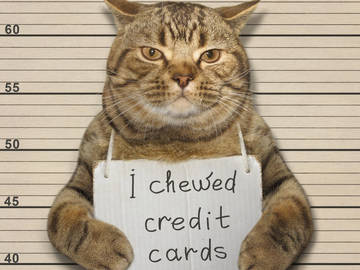What to KnowCredible describes a person or thing that can reasonably be believed (as in "a credible story," or "the witness was credible"), or something that is good enough to be effective ("does a credible impression of her mom"). Credulous typically describes someone who is ready to believe something despite insufficient evidence (as in "credulous people who fell for the scam"), or something that shows this kind of readiness (as in "credulous reporting of far-out claims"). Creditable most often describes what is praiseworthy (as in "a difficult feat accomplished with creditable skill").
The Latin verb credere, meaning "to believe or trust," is the source of a plethora of English words pertaining to belief and trust, including creed, credence, credo, and credit.

This handsome cat's original story was not creditable.
Trust, of course, works two ways, and maybe that's why some credere-derived words are liable to be confused with one another. Take, for example, credible and credulous.
How to Use Credible
Credible describes a person or thing (such as a claim or story) that is likely to be believed or worthy of being believed:
The investigation found the woman to be credible, noting her distressed conversations about the incident with others immediately after.
— Colleen Shalby, The Los Angeles Times, 13 May 2022Dearman cross-examined Rogers asking if he thought Wallace was a credible witness. Rogers said he did find her to be credible since she was the only other person in the room at the time.
— Prescotte Stokes III, AL.com (Alabama), 18 June 2017Much has been written on the history of the Negroni, the most credible story being one of an Italian count Negroni who, in 1919, asked the bartender at Caffe Casoni to boost his Americano (Campari, vermouth and soda) by subbing gin for the soda.
— M. Carrie Allan, The Washington Post, 7 July 2017Moreover, there is no credible evidence that Fridays falling on the thirteenth of a month represented jinxed dates for the United States Navy.
— Joe Nickell, Skeptical Inquiry, September/October 2004
Credible is a synonym of plausible and of course is related to incredible, a word that sees frequent use in describing something so amazing as to not be believed or believable (as in "an incredible feat" or "an incredible coincidence"), and also what is simply impressive or stunning (as in "an incredible sunset").
How to Use Credulous
Credulous, meanwhile, usually describes someone who is ready to believe something despite lacking sufficient evidence to justify that belief. It also describes things that show that same lack of discernment:
Even credulous reporters will think twice before running with another Fusion lead.
— Kimberley A. Strassel, The Wall Street Journal, 12 May 2022Second, spreading overheated rumors about miracle drugs before the evidence is in will lead credulous people to take it without knowledge of proper dosage or considering toxic interactions.
— Ryan Cooper, The Week, 27 Aug. 2021This credulous fascination with prophetic knowledge helps explain the presence of the five larger-than-life female figures—sibyls from Greek and Roman mythology—in Michelangelo's fresco. The sibyls were soothsayers, women who dwelled in sacred shrines and predicted the future in fits of inspired madness, often using obscure utterances such as riddles and acrostics.
Ross King, Michelangelo and the Pope's Ceiling, 2003
Credulous has a close synonym in gullible, a word that, despite rumors to the contrary, is indeed in the dictionary.
How to Use Creditable
A third word that gets tossed into this mix is creditable, which, like credible, can also mean "worthy of belief":
"How many times?" Harry asked, with a creditable imitation of politeness.
J. K. Rowling, Harry Potter and the Order of the Phoenix, 2003The show of force and how quickly MPD mobilized demonstrates that investigators are moving on clues that proved creditable one day but fell apart the next.
Greg Coy, Fox13Memphis.com, 15 June 2017
But creditable more often is used to describe that which is good enough to be worthy of esteem or praise:
And, with help from creditable supporting performances and polished design, director Susan Marie Rhea’s brisk staging showcases the script’s pointed humor.
— The Washington Post, 12 Apr. 2022He played, Erica said, with "great passion, great brio," and, if not with genius, at least with creditable skill—an astounding feat for someone with virtually no musical background who, at forty-two, had taught himself to play.
— Oliver Sacks, The New Yorker, 23 July 2007
Overlap Between 'Credible' and 'Creditable'
Because English likes to keep things complicated, credible also is sometimes used to describe that which is worthy of praise or esteems—or, that is at least good enough to be effective:
Hacks doesn’t spend too much time showing us Deborah’s sets, but Smart and the writers do a credible job of crafting jokes that sound old-fashioned but not completely terrible.
— Jen Chaney, Vulture, 12 May 2022By the age of six he could sketch a credible and expressive human figure, a skill that came as easily to him as repeating a melody after a single listen. With his colored pencils and sheets of paper, he was as good as gone.
— Laney Salisbury et al., Provenance, 2009This is not a surprise given the welcome, gracious atmosphere, the uncommon competence of the kitchen, with its familiar Little Italy Italian menu (I had a nice linguine and clam sauce there once, and left smiling), and the restaurant's credible wine list.
— Mark Bittman, The New York Times, 26 June 2002
Both words can be used to describe things that, rather than deserving belief, deserve an acknowledgment of credit, the kind we speak of when we say "She was given credit for her contributions." So, if you were to say that credible could be conflated with creditable, we'd say that's a credible theory.




